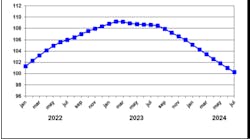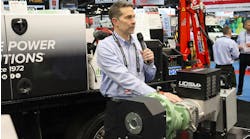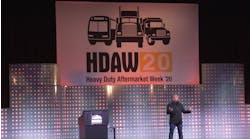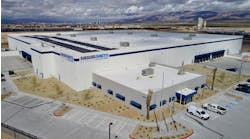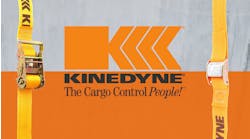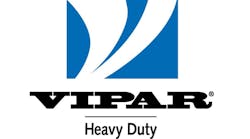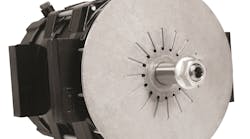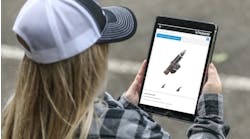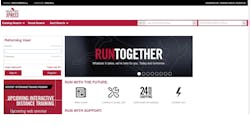HOW are global changes affecting the North American heavy-duty aftermarket?
The key findings of a Transport Intelligence survey:
• India has replaced China as the emerging market with the most growth potential.
• Economic shocks have replaced natural disasters and corruption as the top risk in Asia Pacific.
• Countries in Latin America are losing ground to other emerging markets as a result of recession, political turmoil, and a fall in commodity export prices.
• Oil prices in China’s economy are the leading risks for the global economy in 2016.
• Sub-Saharan Africa remains a frontier market.
To address what’s happening, Tim Walker, executive vice president of sales for Truck-Lite Co LLC, led a Q&A with a panel that included: Tom Clevinger, senior vice president and general manager, Global Truck & Bus, Navistar, Inc; Bill Gordon, president, Aftermarket Division, Bergstrom; Jeev Khanduja, vice president, Automann; and Emily Poladian, managing director, Asia, Firestone Industrial Products.
Q: Address what it’s like when you’re in a particular market generating business and all of sudden something changes. What do you do then?
Clevinger: We were in Russia selling new trucks when this whole thing came down in the Ukraine. It pretty much shut business off. We don’t sell trucks in Russia anymore. In the process, we closed our office. It’s a difficult situation. We still maintain contact. We maintain a parts business there. We still sell to dealers in Russia, and they buy and they are paying the bills. The parts business is probably half of what we used to do, but there’s still something there. Twelve to 15 months ago in Ecuador, we were selling trucks and buses, and the government initiated a 45% surcharge on trucks coming into Ecuador, which killed the business in Ecuador. But they did so because they were running out of dollars. They had no choice. When you get in those situations, you just have to be confident, careful, but also understand most of this stuff is temporary and you’ll sell more down the road when the time is right.
Gordon: Tom is very right. This is a very cyclical market. If you look at Bergstrom’s makeup, we do mining, which is in the tank. We do construction, which maybe is not in the tank but certainly not as strong as it used to be. We do agricultural. We lost the way to depreciate the equipment, and the crops are worth half of what they were before. Automotive in Europe and off-highway in Europe is not at all attractive right now. So our bright star is the aftermarket. We’re looking at expanding the aftermarket globally and trying to find products we need in each of these global areas. This is what my boss has tasked us to do—to figure out these markets, get the right parts and have them at the right price, and find your distribution. Distribution in Europe is similar to what it is here in the United States. You have independent distributors—Continental, Europart, Warner, other big players—and you have your OEM/OES channel that is now just becoming an all-makes program. But the others are coming along right behind them: Scania, Mercedes. So we see the aftermarket as the bright spot domestically and abroad.
Q: Is there a favorite market you’re pinpointing or targeting to go gangbusters in the coming years?
Gordon: We think down the road that the African market is going to help us a lot. They’re going to have to have some infrastructure, and that’s going to help with construction equipment. They’re going to have to build roads, and that’s going to help us. They’re going to have to move parts, and that will help us with trucks. The infrastructure except for big cities is kind of rough, and that helps us with the parts.
Q: Jeev, you have some experience with Russia and other parts of the world. Maybe they haven’t been so good, but what about other places?
Khanduja: The bad experiences could have happened in New York City or anyplace else. It certainly has given me a little more insight into where I go and what I do and how I do it. For us, I was 18 years old and going to college for the first time. I was a freshman when my dad said, ‘Hey, I’m going to Latin America in June. Would you like to come?’ I said, ‘Sure.’ I took two years of Spanish in high school. So we get to Colombia and we’re at this show and he says, ‘Let’s take two more weeks and visit some of the other countries. We don’t know where the opportunities are. We don’t know these companies we need to visit to go sell parts. What’s the word for truck in Spanish?’ I said, ‘Camion.’ ‘What’s the word for parts?’ ‘Repuestos.’ ‘Great. Get a phone book, look up those two words, write down addresses, and let’s look at these places.’ That was my training. We’ve used that in every country we’ve gone to. I literally will land and even if I have appointments, I will Google and get addresses and take a cab around and see what’s what. A lot of times you drive past a place and see there’s a ton of Navistar trucks. You say, ‘Oh, well, here we go. Tom’s already here. Excellent.’ You’d be shocked. We were at trade show in Russia in St. Petersburg in 2001, and there’s no traffic. Nothing. My dad said, ‘Let’s go check the city.’ We were driving down the highway and a large truck came by. He told the cab driver, ‘Get me in front of that truck,’ and we got to get in front of him and stopped him. Voila. Business in Russia. You don’t want to put yourself in harm’s way, but go for it.
Q: Emily, you said you’ve had some issues in Malaysia. What’s the bright spot? Where are you looking for good results in Asia?
Poladian: The challenge for Firestone is not only parts that a lot of you in this room make and they’re used on every vehicle, but air springs are only on air suspension vehicles, obviously. There are a lot of trucks in China. There are not many currently using air suspension, but we see it coming. We see it on the close horizon. There are some things in play in the government with regulations that are going to change, and we think are going to make this a good opportunity for us. It’ll be more than just buses in China. India has been hot and cold. It’s doing really well right now, but again, it’s limited. Not all the vehicles are using air suspension there. It’s really more lift axle business. So Asia, in total, really remains a bright spot for us because as the product line is adopted, we’ll just actually have that ability. ♦
